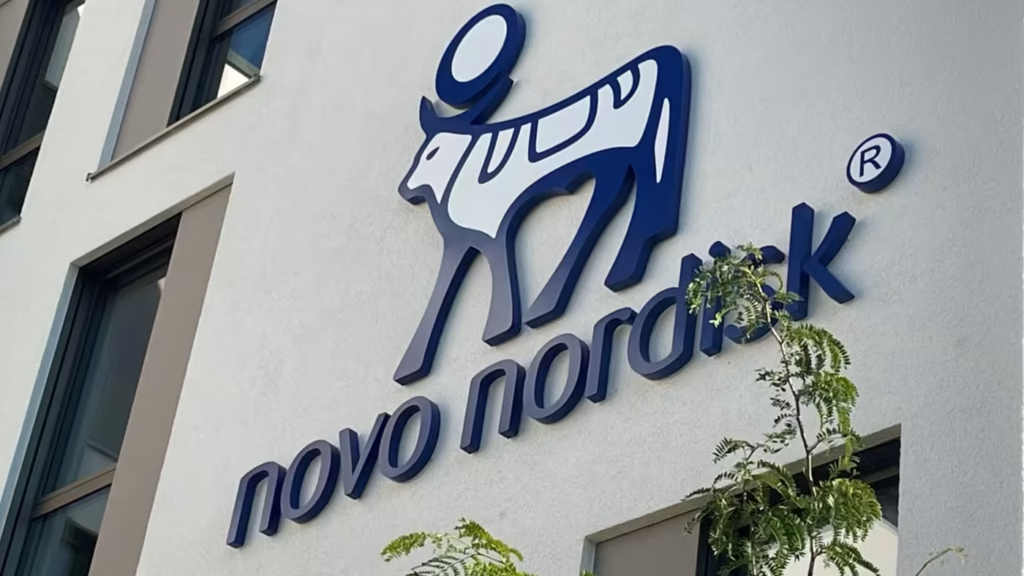NEWS
Novo Nordisk Faces Setback as Obesity Drug Trial Falls Short

Novo Nordisk has faced a major setback after releasing disappointing trial data for its latest obesity drug, CagriSema. The announcement caused a sharp drop in the company’s stock, with its American depositary receipts falling by as much as 28% at one point and eventually stabilizing at an 18% decline, trading at $83.87 in premarket trading. In Denmark, the company’s Copenhagen-listed shares dropped 23% by midday trading, marking a significant decline for the pharmaceutical giant renowned for its blockbuster drugs Ozempic and Wegovy.
The clinical trial for CagriSema revealed that patients who used the drug experienced an average weight loss of 22.7% over 68 weeks. While this result outperformed Novo’s older treatments, it fell short of the company’s ambitious 25% weight-loss target. Further, only 40% of trial participants achieved a weight loss of 25% or more, a figure that disappointed both investors and analysts.
CagriSema is a combination drug that merges semaglutide, the active ingredient in Ozempic and Wegovy, with cagrilintide, another promising component. Despite its improved performance compared to Novo’s existing treatments, CagriSema barely edged out Eli Lilly’s competing drug, Mounjaro, which demonstrated a weight reduction of 22.5% in trials. This slight difference failed to inspire confidence in Novo’s ability to deliver a market-leading product.

Novo Nordisk Stock Drops After Obesity Drug Trial Miss
In contrast, shares in Eli Lilly, Novo’s primary competitor, surged following the announcement. Eli Lilly’s stock rose 9% to $825.37, reflecting investor optimism about the company’s position in the obesity treatment market. Lilly, which also produces Mounjaro and Zepbound, is now seen as a stronger competitor as it continues to challenge Novo for dominance in the lucrative market for obesity and Type 2 diabetes drugs.
Novo Nordisk and Eli Lilly have long been at the forefront of this market, but competition is increasing as other pharmaceutical companies work to develop their own treatments. Obesity and diabetes drugs have become a critical focus within the pharmaceutical industry due to rising obesity rates worldwide and the growing demand for effective solutions. Analysts have predicted that the market for weight-loss drugs could grow to $200 billion by the early 2030s. However, recent events have cast doubt on the extent of demand for these treatments, leading to heightened scrutiny from investors.
The disappointing trial results for CagriSema have raised questions about Novo Nordisk’s ability to maintain its leadership in the obesity drug market. The company has enjoyed tremendous success with Ozempic and Wegovy, which have gained widespread recognition for their effectiveness. However, the high expectations surrounding CagriSema underscore the intense competition and the challenges of meeting both medical and market demands.
Eli Lilly’s strong market performance highlights the shifting dynamics in the weight-loss drug sector. With its effective treatments and competitive pricing, Lilly has successfully expanded its footprint, attracting both patients and investors. The company’s stock surge following Novo’s announcement underscores its ability to capitalize on rival missteps and strengthen its position as a leading player.
Despite the challenges faced by Novo Nordisk, the potential for growth in the weight-loss drug market remains significant. Rising obesity rates and advancements in pharmaceutical science have created a substantial demand for effective treatments. However, the market is becoming increasingly crowded as more companies enter the space, intensifying competition and raising the stakes for innovation.
Novo’s setback with CagriSema also reflects broader concerns about affordability and accessibility in the weight-loss drug market. While these treatments have demonstrated significant potential, their high cost has raised questions about their accessibility to a broader population. Addressing these concerns will be crucial for companies aiming to sustain growth in this sector.

Novo Nordisk Stock Drops After Obesity Drug Trial Miss
The future of obesity and diabetes treatments will likely hinge on the ability of companies like Novo Nordisk and Eli Lilly to navigate these challenges and continue to innovate. The clinical trial results for CagriSema serve as a reminder of the complexities involved in developing breakthrough drugs that meet both clinical and market expectations.
For Novo Nordisk, the focus will now shift to rebuilding investor confidence and addressing the shortcomings highlighted by the trial data. The company has a strong history of success in the obesity and diabetes markets, but it will need to demonstrate its ability to adapt and innovate in the face of growing competition.
Eli Lilly, on the other hand, is well-positioned to capitalize on its recent success. The company’s diverse product portfolio and strategic moves to expand its market presence have strengthened its competitive advantage. Lilly’s ability to maintain momentum and continue delivering strong results will be critical to its long-term success.
As the market for obesity drugs continues to evolve, the race to innovate will intensify. Both Novo Nordisk and Eli Lilly will need to address key challenges, such as improving affordability, demonstrating long-term efficacy, and navigating the complexities of regulatory approval. The stakes are high, but the potential rewards are even higher, as the demand for effective weight-loss treatments continues to grow.
Novo Nordisk’s disappointing trial results have undoubtedly dealt a blow to the company’s stock and market reputation. However, the broader outlook for the weight-loss drug market remains optimistic. With continued advancements in pharmaceutical science and a growing focus on addressing global health challenges, the future of obesity and diabetes treatments holds promise, even amid the current setbacks. The coming months will be critical for Novo Nordisk as it works to recover from this setback and reaffirm its position as a leader in the pharmaceutical industry.
NEWS
Timberwolves’ championship odds improve after three Game 1 upsets

The second round of the 2025 NBA Playoffs has zagged, and the championship odds of the Minnesota Timberwolves came into sharp focus. This weekend, three of the most powerful and talented squads in the form of the Oklahoma City Thunder, Boston Celtics, and Cleveland Cavaliers were all stunned early as they each dropped their first games of their respective series. All three were heavy favorites — all of them eight-point favorites or more — and all failed to win on their own courts. Those early upsets have further staggering the playoffs and drastically moving betting markets.
The Timberwolves are among the biggest beneficiaries of these results. Their odds to win the championship have certainly improved. Heading into May 2, their odds were, +1700 but after the string of Game 1 upset victories, those odds had improved to +1100. In implied probability terms, that leap means rising from a 5.56 percent likelihood of winning the championship to 8.3 percent, a significant jump in a crowded postseason.
Here are the latest odds for your favorite golfers, with all updated numbers courtesy of FanDuel Sportsbook. The Thunder were +155 and the Celtics were +185 to win the conference prior to the game. The Cavaliers’ odds, meanwhile, held at +500, which means that while they lost, the market isn’t selling them just yet. On the flip side, the Timberwolves, Nuggets and Knicks and Pacers all got a big break. And no team had a swing quite like Denver, which went from +5000 to +1500, the move indicative of more and more of you believing in their ability to cash in the postseason.
This shift in momentum couldn’t be playing out at a worse time for the Timberwolves, who open Game 1 of their Western Conference semifinal series by hosting the Golden State Warriors. Minnesota is favored to win by 6.5 points, and a win would only further solidify their place in the hearts of betting lines and analysts everywhere. The Timberwolves arrived in the playoffs with only the ninth-best championship odds, but their continued presence and the foibles of higher-ranked squads are starting to draw more interest.
Visiting teams winning Game 1 have been a rarity in N.B.A. history, but so far in this round, the victorious Game 1 teams all have been the road teams. The Timberwolves hope to buck it Tuesday night by taking care of their home court. If they can win this series against the Warriors, not only will their series chances appear better, but their long-term championship forecast will get even brighter.
Factor in that part of the drama is the Spurs still not knowing who, if anyone, of All-Star guard Steph Curry would play for the Warriors because of his ailing hamstring. This could even further tilt the scales in Minnesota’s favor for Game 1. And there have been humorous scenes, such as when Warriors forward Buddy Hield arrived at a media session wearing the wrong shorts for Game 1, or when Draymond Green had to walk back his promise not to get suspended, referencing a scuffle he had with the Jazz’s Rudy Gobert.
Though some fans are (understandably) pessimistic regarding the possibility of Minnesota going all the way to the NBA Finals, betting trends and recent performances indicate that they’re becoming a serious force. The team is resilient, recovering from difficult times, and in a better place than most probably thought it would be at this point. Their odds are based on a combination of their strong play and the flaws exhibited by the teams trying to catch them.
Betting odds can and will change and nothing is definitive in the unpredictable world of playoff basketball, but it’s actually evident that as much as they’re not a favorite just yet, Minnesota is no longer viewed as a long shot. They have gone from under-the-radar contenders to legitimate threats, and if they can keep up this level of play, a deep postseason campaign, or even a title shot, no longer sounds like just a pipe dream.
And as the playoffs move forward, it will be interesting to see, regarding both fans and bettors, just how closely people are watching the Timberwolves, who are suddenly a team generating a lot of interest. Their story just keeps getting better and better every game, and the numbers are finally starting to reflect what could be an earth-shattering moment for the franchise.
NEWS
Kohl’s just fired its brand new CEO for unethical behavior

Kohl’s Kohl’s has had headline-grabbing shareholder activism that included the abrupt ousting of its C.E.O., Ashley Buchanan, only months into the job. He is leaving as the company reels from accusations of unethical behavior that have jolted the business and prompted larger questions about how accountable leadership is and about corporate oversight. Buchanan, who was hired as its chief executive in January 2025, had been meant to help right the ailing department store chain. Instead, he is departing under a cloud of scandal after an internal investigation found that he broke serious rules of the company during his time in charge.
The company said it had fired Buchanan “for cause,” an unusual and major decision in the corporate realm. An outside investigation determined he had ordered the company to engage in transactions with vendors that presented undisclosed conflicts of interest. In simpler language, he was using his role to help conduct business that could have profited him or close associates, without informing the company. The company said that these actions did not involve Kohl’s financial reporting or other employees, but a decision to fire a chief executive just months into the job is also one with outsize implications.
Previously, Buchanan was the CEO of arts and crafts retail chain Michaels. His appointment had been hailed as a bold move to help turn around Kohl’s, which is struggling amid weakening sales and mounting competition in a challenging retail landscape. Yet his stint in office was also followed by further reversals. According to a review of preliminary financial results from Kohl’s, the company’s sales declined by 4.3 percent during his brief time on the job — far short of the turnaround that shareholders were looking for.
The company’s board of directors has named Michael Bender, the current chairman, interim CEO as they search for a new permanent CEO. But the market actually applauded the departure of Buchanan, it surprisingly rose. Shares in Kohl’s jumped as much as 8 percent after the announcement, indicating that investors may have already lost faith in his leadership or are hopeful that new leadership can turn the company around.
Retail analysts are less sanguine. The firing comes as a distraction for the company at a particularly bad moment, said Neil Saunders, managing director at GlobalData Retail. “While the dismissal may have nothing to do with overall company performance, it does add to the perception outside the company that things are a bit shaky. Saunders said it was a “blow upon a bruise,” meaning the move exacerbates already existing problems instead of addressing them.
Like many traditional department stores, Kohl’s has been under extreme pressure in recent years. Shifting consumer tastes, the rise of online shopping and persistent inflation have made it difficult for brick-and-mortar companies to stay profitable. On top of Western leadership woes, the company also is facing the reality of declining foot traffic and ever-more price-sensitive shoppers.
Earlier this year, Kohl’s also shared plans to shutter 27 locations in the U.S. These closures have brought the company’s total store count to about 1,100, representing a significant reduction in the retailer’s store footprint. The move is part of a broader shift in the industry, in which many legacy retailers are rethinking their physical footprints as they try to adjust to a more digital economy.
The repercussions of Buchanan’s firing could be widespread. For Kohl’s, they raise questions of how closely executives are scrutinized and what kinds of internal controls should exist to keep similar problems from happening in the future. For shareholders, it casts further doubt on the direction of the company and questions about who is leading. For the general business public, the case should stand as a reminder that not even top brass is immune from examination and answerability.
The road that lies ahead for Kohl’s is unclear. With interim leadership now secured and a search for a CEO underway, the company needs to move fast to win back the trust of investors and navigate a new course. The scandal is an unnecessary wrinkle to an already difficult environment and who knows, maybe the company does come out stronger. Or maybe this is just another chapter in its struggles.
NEWS
Dwayne Johnson, is that you? See his dramatic new look as UFC fighter Mark Kerr in ‘The Smashing Machine’ trailer

Dwayne Johnson is stepping into what may be the most transformative role of his acting career, taking on the part of legendary UFC and MMA fighter Mark Kerr in the upcoming film “The Smashing Machine.” This gritty biographical drama, set to release on October 3 and directed by Benny Safdie, offers a deep dive into the life of Kerr—an athlete whose raw physical power in the ring was matched only by the personal demons he battled outside of it. Known widely for his blockbuster action roles, Johnson’s portrayal here marks a significant and deliberate shift toward more dramatic, character-driven storytelling.
In the newly released trailer, Johnson is almost unrecognizable. Though he hasn’t publicly addressed his physical transformation in great detail, it’s apparent that facial prosthetics and careful styling have helped him bear a striking resemblance to Kerr. The fighter’s story, originally featured in the 2002 HBO documentary also titled “The Smashing Machine,” captured the brutal realities of early MMA competition and revealed Kerr’s struggles with substance abuse and emotional turmoil. Johnson appears to embrace every layer of this complexity, channeling the vulnerability and intensity that defined Kerr’s life both inside and outside the ring.
The trailer provides glimpses of the brutal, adrenaline-charged world of professional fighting—raw and visceral in its execution—but it also reveals a far more intimate narrative. Central to this is Kerr’s relationship with his girlfriend, played by Emily Blunt. Reuniting with Johnson after their time together in Disney’s “Jungle Cruise,” Blunt brings a grounded emotional presence to the film. The tension between their characters, caught between love, ambition, and addiction, adds an essential human depth to the story.
In one poignant moment in the trailer, Johnson’s Kerr reflects on the intoxication of success, saying, “Winning is the best feeling in the world. It’s 40,000 people in there cheering you on. There’s no other high like it in the world.” This line encapsulates the highs and lows Kerr experiences as he navigates fame, pain, and a relentless pursuit of victory. Johnson’s delivery is full of gravitas, suggesting a layered performance that digs much deeper than anything he’s previously taken on.
For Johnson, this role is not just a creative departure but a personal challenge. In an interview with GQ last year, he shared that the opportunity to portray Kerr felt like a chance to break new ground in his career. “It was also an opportunity for me, I realized, to stretch myself in ways that I hadn’t been stretched yet,” he explained. “And also challenge myself in ways that I hadn’t been challenged.” That drive to evolve, both as an actor and a storyteller, is evident in every frame of the trailer.
While Johnson has been busy in other areas—voicing Maui once again in “Moana 2,” returning to the WWE ring, and joining the board of TKO Group Holdings following the WWE-UFC merger—“The Smashing Machine” stands apart as a pivotal moment in his career. It’s not about larger-than-life action heroes or comedic charm. It’s about stepping into someone else’s pain and perseverance, and doing so with authenticity.
Director Benny Safdie, making his solo debut after co-directing acclaimed films like “Uncut Gems” with his brother Josh, brings a raw, almost documentary-style realism to the project. His past work has been praised for its tense, emotionally charged storytelling, and “The Smashing Machine” appears to follow in that tradition. The film is likely to appeal not only to fans of MMA and biopics but also to those interested in the psychological complexities that come with public glory and private battles.
As anticipation builds for the release, “The Smashing Machine” seems poised to redefine what audiences expect from Dwayne Johnson. Known affectionately as “The Rock” by his wrestling fans, Johnson is now forging a new path—one that embraces nuance, hardship, and a kind of storytelling that doesn’t rely on spectacle alone. If the trailer is any indication, his turn as Mark Kerr could be one of the most powerful performances of the year.
With a compelling cast, a gripping true story, and a fearless lead performance, “The Smashing Machine” might not just be a film about fighting—it could be a knockout moment in Johnson’s cinematic journey.
-

 Health Care2 years ago
Health Care2 years ago7 Surprising Ways to Lower Cholesterol Naturally – No Medication Needed
-

 Entertainment1 year ago
Entertainment1 year agoAustin Abrams Discusses ‘Wolfs,’ Future Projects, and ‘Euphoria’ Season 3
-

 Health Care2 years ago
Health Care2 years agoPink Eye(Conjunctivitis): What Is Commonly MISDIAGNOSED As PINK EYE?
-

 Celebrity2 years ago
Celebrity2 years agoRelationship Lessons from Jennifer Lopez and Ben Affleck
-

 Entertainment2 years ago
Entertainment2 years agoZendaya Opens Up About Racy Scenes and Family Reactions in New Film
-

 NEWS2 years ago
NEWS2 years agoIs Trump Going To Jail? Your Questions About Trump’s Trial Answered
-

 Entertainment2 years ago
Entertainment2 years agoZendaya and Tom Holland kiss at The London Challengers premiere.
-

 Entertainment2 years ago
Entertainment2 years agoChris Martin and Dakota Johnson reportedly got engaged years ago




